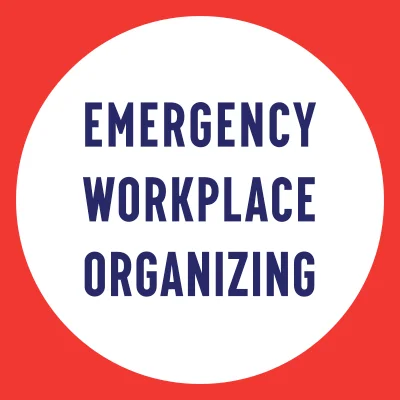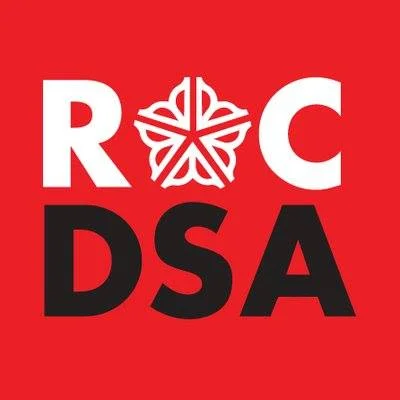

Check out our interview with WAER
Hello there!
Come check out our interview with WAER on the DSA, Mamdani, Ehrenreich and public policy. You can find audio of the interview half way down the page.
https://www.waer.org/news/2026-01-14/syracuse-democratic-socialists-say-election-wins-by-mamdani-ehrenreich-can-improve-public-policy


Bobby Gronert: Why MADSA should endorse Francesca Hong for Governor
by Bobby Gronert and Wesley Hoy
Comrades of UW-Madison YDSA and Madison-Area DSA,
As we approach one of the biggest decisions in the history of Madison-Area DSA and UW-Madison YDSA, we want to share our thoughts on the question of endorsing Francesca Hong.
This question comes at a time of crisis. Wealth continues to accumulate in the hands of those who already have it, as life gets worse for those destitute and barely getting by. No longer able to satisfy our bloodlust purely overseas, Nazi admirers have been armed by the state and sent to walk our streets; “a force of the unemployable terrorizing the employed”, to paraphrase Will Menaker. Liberal institutions, the entire system of liberal democracy, seems to only continue to be swept away by the rising fascist tide. Actions like NSPM-7, which designates “anti-capitalist” groups as domestic terror organizations, are already putting socialists in the crosshair, and it’s only a matter of time until they act on their ambitions and use their Gestapo to come after us too.
We did not choose the troubling circumstances we find ourselves in. While the fascists are organized in their cruelty, staying passive is recklessness bordering on negligence. For these reasons, although we hold some reservations about Fran’s campaign, we strongly encourage MADSA to vote to endorse her for Governor of Wisconsin.
To fight this regime, we need to organize working people from the Mississippi River to the Monongahela Valley. In Fran’s campaign, we have been presented an opportunity to do just that in Wisconsin. Just as Bernie Sander’s 2016 campaign grew DSA from 8.5k on election day to 21k in 2017, or how Zohran’s upstart Mayoral bid doubled NYC DSA’s membership rolls, Fran’s statewide campaign will not just grow MADSA’s organizing in Madison — it will empower rural working communities to join our fight too.
As co-chairs of YDSA’s Electoral Working Group at UW-Madison, we can seamlessly integrate Fran’s campaign into our campus organizing alongside our campaign for Common Council District 8. This will demonstrate our maturity and seriousness to students desperate for a legitimate way to fight fascism. In this country, many see elections and police-approved protests as their only way to participate in politics. A statewide socialist campaign would mobilize this mass of politically unorganized young and working folks, and would draw together a coalition hungry for change into an actionable, growing, and revolutionary movement statewide.
By harnessing the potential of Francesca Hong’s gubernatorial campaign, we could create a statewide socialist movement that transcends the rural-urban divide by connecting DSA chapters across the entire state. We envision a future of constant cooperation between Madison and Milwaukee DSA, YDSA Chapters at Superior, Oshkosh, Parkside, Stout, and even high schools around the state. Though we were pleased to see 150 people in the room for Fran’s Candidate Forum during the most recent General Meeting, 150 people in Madison will not win this fight, and will not satisfy us. We hope to see 150 DSA members in a room in Platteville, as a working class movement does not win back Southwestern Wisconsin for the Democrats, but wins it for DSA. With the Fran already amassing over 1,500 volunteers for her campaign, she presents a clear first step in this vision.
Minnesota Gov. Tim Walz recently said that our only way to fight this fascist tide is “in the courts and at the ballot box.” As Democratic Socialists (emphasis on the D), we know the ballot box not to be the only expression of working class democracy, and the courts not to be an ally of the working class at all. Organizing doesn’t stop at the ballot box, and the momentum we bring to this campaign doesn’t either. DSA must not be just an organization, but be the organization behind this campaign, defining its policy, its strategy, and providing a healthy source of manpower and enthusiasm.
Just as our campaign won’t die on April 7th, we must make sure that Fran’s does not meet its end on August 11th or November 3rd. We will rally for Fran when she produces tangible wins for working people, and ensure these wins are seen as products of the socialist movement. If Fran delivers on universal childcare, guaranteed paid leave, free school means, legalizing cannabis, and criminal justice reform, they will be seen as victories of socialism, not the Democratic Party. And when she fails to deliver, we will stick to our principles as a chapter and hold her accountable.
As Eugene Debs once said: “I can see the dawn of the better day for humanity. The people are awakening. In due time they will and must come to their own.” The tradition of socialism in Wisconsin has remained dormant for too long. We must fight to re-awaken the masses.
A new era for Wisconsin socialists is here.
In solidarity,
Bobby Gronert and Wesley Hoy
Co-Chairs of the UW-Madison YDSA Electoral Working Group
Carter Burg contributed to this piece.


Will ICE ignite a mass strike in Minnesota?
Labor federations have called for a day of protest January 23. The momentum is growing from mass protests and building on long-term organizing.
The post Will ICE ignite a mass strike in Minnesota? appeared first on EWOC.


Don’t Settle for the Partial Revolution
The following remarks were delivered at the Rochester People’s March, Jan. 17, 2026.
As we gather, take a moment to remember the legacy of those who came before us: Those who organized for the abolition of slavery. Those who formed unions in their workplace to fight for the weekend and the 8-hour day. Those who opposed the imperialist war on Vietnam, and those who engaged in the struggles for Black, Queer, and feminist liberation.
These struggles are ongoing. The legacy of segregation is only too clear, even here in our backyard. But these struggles have also given us a legacy of empowerment. They have planted seeds that are bearing fruit today, in demonstrating how the organized working class can rise up against the source of our oppression.
Our struggles are interconnected by the engine of capitalism; seeking endless expansion, extraction, and dehumanization in pursuit of domination and profit. We must shut off this engine of misery at its source. Too often we have witnessed the regulatory capture and rollbacks that have negated limited reforms.
We cannot limit ourselves to a partial revolution against systems of oppression. The time for “reasonable” demands is over. Those who transformed the world in preceding decades did not ask nicely, but demanded radical change.
Our current moment is about more than the defeat of Donald Trump. To quote Mayor Mamdani, “This is not only how we stop Trump, it’s how we stop the next one.” This is about overturning the conditions that gave rise to Trump; about creating a world where everyone is granted the opportunity for a dignified existence. Let us live in community with one another, with the goal of meeting our collective needs rather than maximizing individual gain.
Get organized: Join DSA. We are building the structures we need to create an alternate future to the path of destruction we are currently on. May the seeds we plant today sprout into a beautiful tomorrow.

The post Don’t Settle for the Partial Revolution first appeared on Rochester Red Star.


The Cloud is Material: The Threats and Costs of Data Centers


A Socialist Repaired My Brake Light and All I Got was a New View on Policing


The New Colonialism: A Review of Karen Hao's Empire of AI


Brian Owendoff’s One Big Club (You Ain’t In It)
Brian Owendoff sent racist text messages about Portland City Councilors to a group chat of local pro-corporate political agitators. Our research reveals he’s just one node in a network of powerful people trying to cut taxes for the rich, balloon the police budget, and make it harder for Portlanders to survive.

Brian Owendoff, the commercial real estate developer and recently-unmasked bigot, is many things to many people.
To the City’s well-heeled real estate class, he’s a longtime wheeler and dealer of Portland’s prime commercial parcels. To the Portland Metro Chamber (Portland Business Alliance) he’s a former registered lobbyist and frequent collaborator. Owendoff is also a noisy critic of the Left; he’s published dozens of articles to his Substack attacking DSA.
The Owendoff network is far-reaching. Democratic Party elites like City Councilor Dan Ryan rely on his counsel. Corporate power players like Jordan Schnitzer have rubbed elbows with Owendoff in multiple board roles over the past decade-plus. He’s also a central figure in the emerging ecosystem of right-wing and corporate dark money PACs trying to intervene in Portland’s elections.
Online Agitator
Tuesday’s revelations, first reported by the Portland Mercury, was not the first time Owendoff made headlines for disparaging local politicos. Years before he called Portland City Councilor Angelita Morillo a “burrito”, Owendoff was in hot water for attacking another sitting Portland official. In 2011, Owendoff was fired from his job at real estate firm C.B. Richard Ellis after he was linked to anonymous comments posted to the OregonLive website, which disparaged then-Mayor Sam Adams.
Despite his toxic political persona, Owendoff’s rise to become a powerful real estate and influence broker continued unabated.
Owendoff is currently a member of and contributor to the real estate industry’s latest political venture, the Revitalize Portland Coalition (RPC). RPC is a coalition of interests who benefit from Portland’s housing and homelessness crisis, led in part by real estate magnate Jordan Schnitzer. The Coalition spent lavishly to sink Measure 110 and has previously endorsed a slew of corporate-friendly candidates, including bike cop Eli Arnold and Bob Weinstein (more on Bob below), both of whom lost their recent City Council races.
Another Owendoff connection: Schnitzer Industries has long occupied a board seat at the Portland Metro Chamber, where Owendoff was formerly a registered lobbyist and board member.
Big Business

Schnitzer and PRC together represent a significant nexus of power in Governor Tina Kotek’s effort to sabotage Preschool for All, which is also a frequent target of the PACs in Owendoff’s orbit.
Among those invited to the group-chats where Owendoff sent racist text messages last week were a host of right-wing political hopefuls and activists with their own ties to Portland’s business lobby.
Bob Weinstein co-founded dark money PAC Partnership for Progress (PfP) with failed City Council and County Commission candidate Vadim Mozyrsky. PfP promoted Eli Arnold, the bike cop endorsed by Schnitzer’s Revitalize Portland Coalition. Arnold is also an Owendoff group chat member.

The incestuous political relationships within Portland’s ruling class are headspinning, but no analysis would be complete without reference to Vikki Payne. Payne is another Owendoff group-chat participant, who founded the Future Portland PAC to attack local labor unions and non-profits.
Dark Money
Until she was fired last year, Payne worked for the campaign and office of Multnomah County Commissioner Julia Brim-Edwards. According to the Mercury, “…while Payne was working for Brim-Edwards, Future Portland propped up Brim-Edwards’ proposed legislative policies and statements…”
Despite her outside support for Brim-Edwards’ priorities, including her longtime effort to cut Preschool for All, Payne got the axe after being caught hosting PAC events on County time.
Payne isn’t just an Owendoff compatriot. Future Portland is a “pragmatic partner” of the Schnitzer-led Revitalize Portland Coalition and the right-wing Northwest Fresh podcast, hosted by now-fired Dan Ryan staffer Andy Chandler (more Councilor Ryan public records to come!). Northwest Fresh is a regular platform for local anti-trans activists, Republicans, and anti-public school advocates, as well as current City Council member Dan Ryan and Mayor Keith Wilson.

Phew! Unraveling the political machinations of Portland’s ruling class can make your head spin. But remember: the enemies of Portland’s working class are not an unknowable Illuminati; they are real people with names, prejudices, and weaknesses. We are uncovering new connections all the time, and since these folks can’t help themselves, we expect this map to grow. Watch this space! 
###
If you enjoyed this article, please donate an hour of your hard-earned pay to each of Portland DSA’s working class champions for office:
For Portland City Council, we endorsed Councilor Angelita Morillo, she joins now re-endorsed Councilors Mitch Green, and Tiffany Koyama Lane.
In Salem, we re-endorsed Incumbent Farrah Chaichi for House District 35, alongside our earlier endorsement of Tammy Carpenter for House District 27. Salem DSA also endorsed incumbent Leslie Muñoz for House District 22.
The post Brian Owendoff’s One Big Club (You Ain’t In It) appeared first on Portland DSA.



